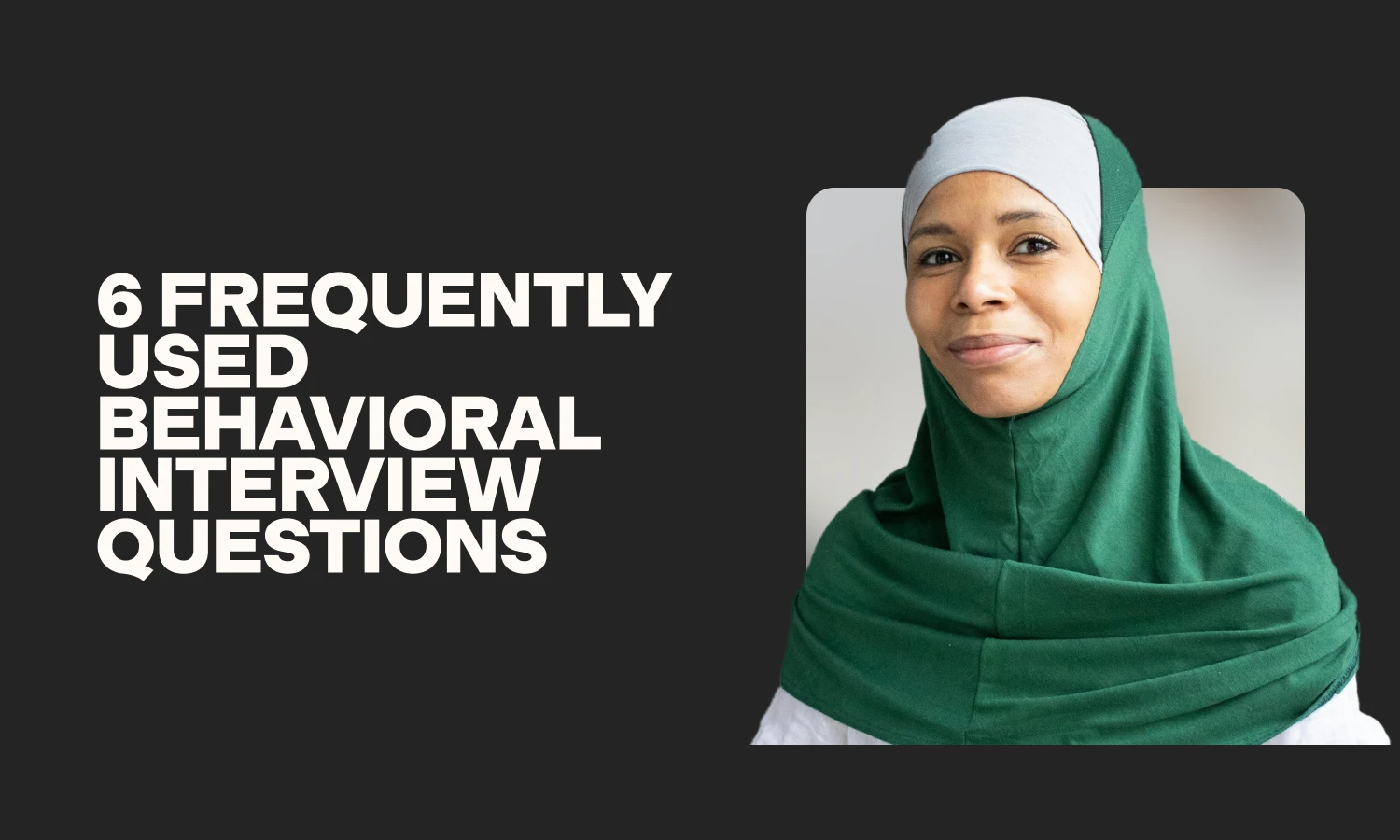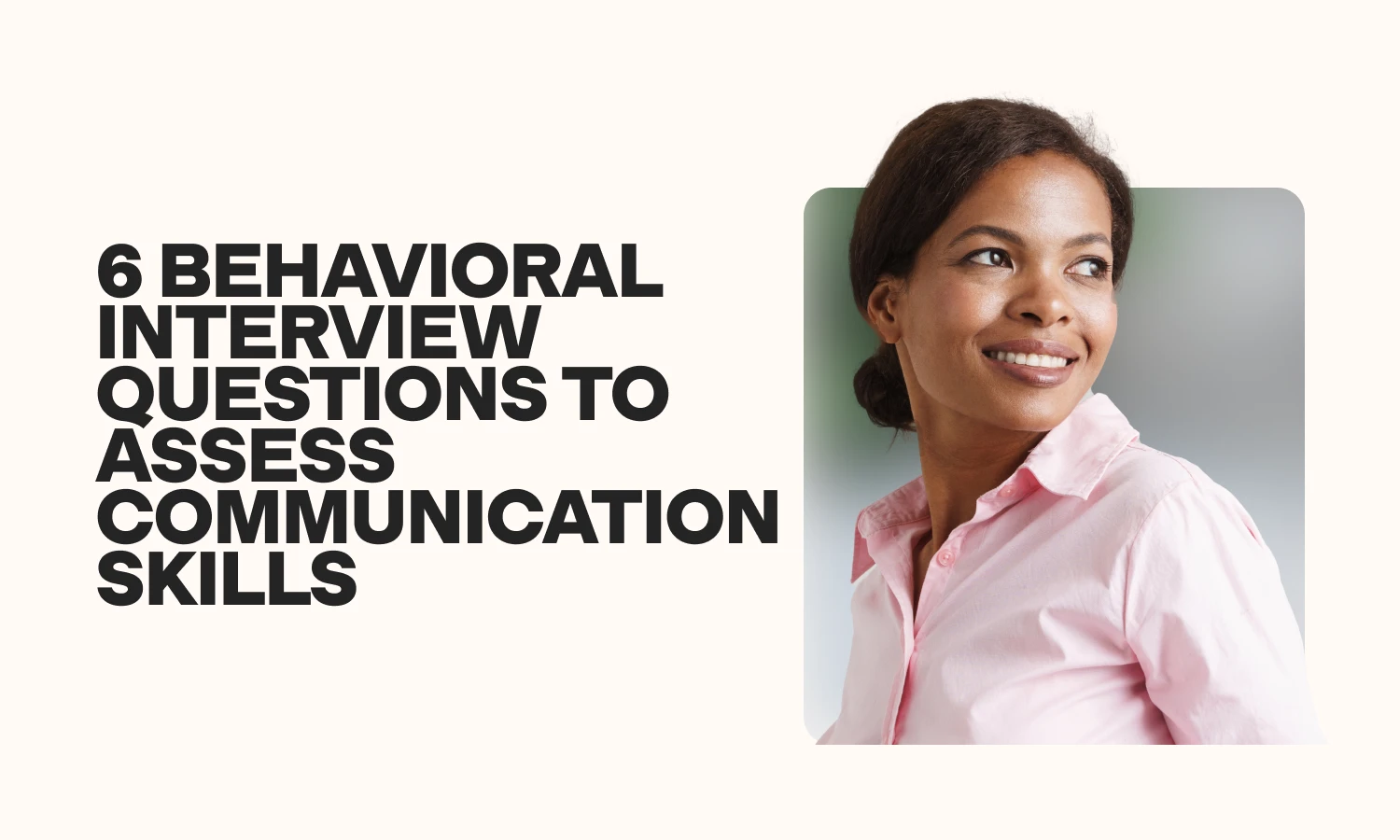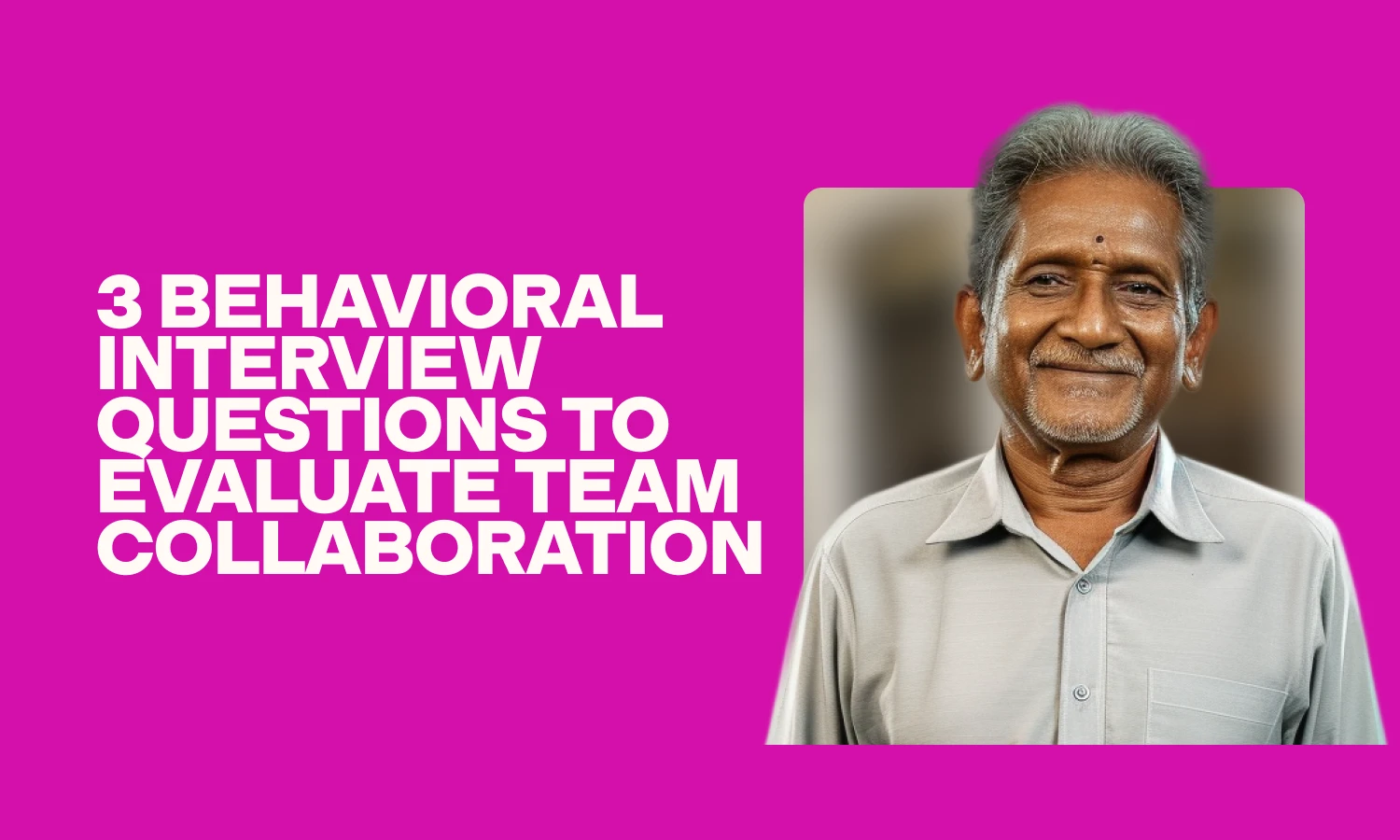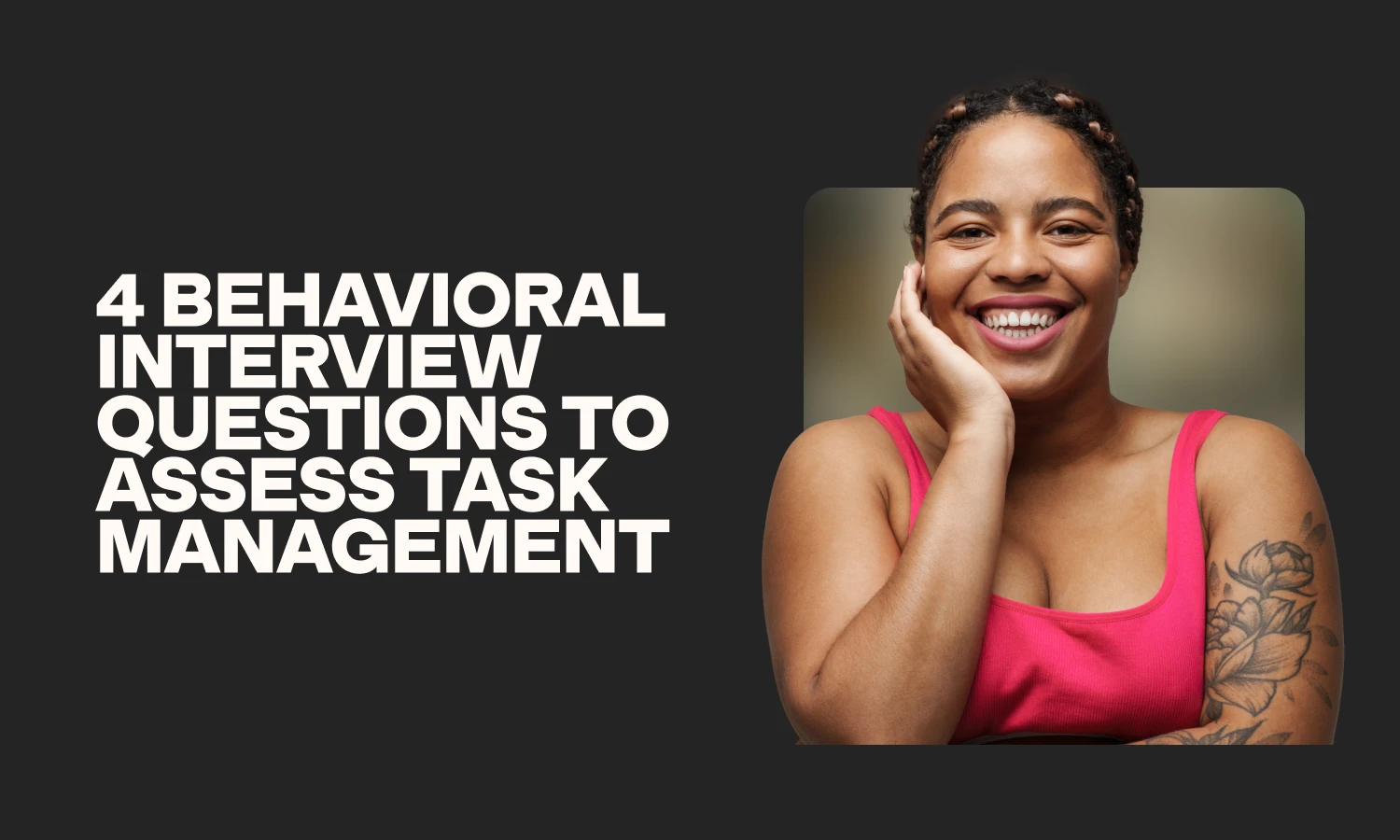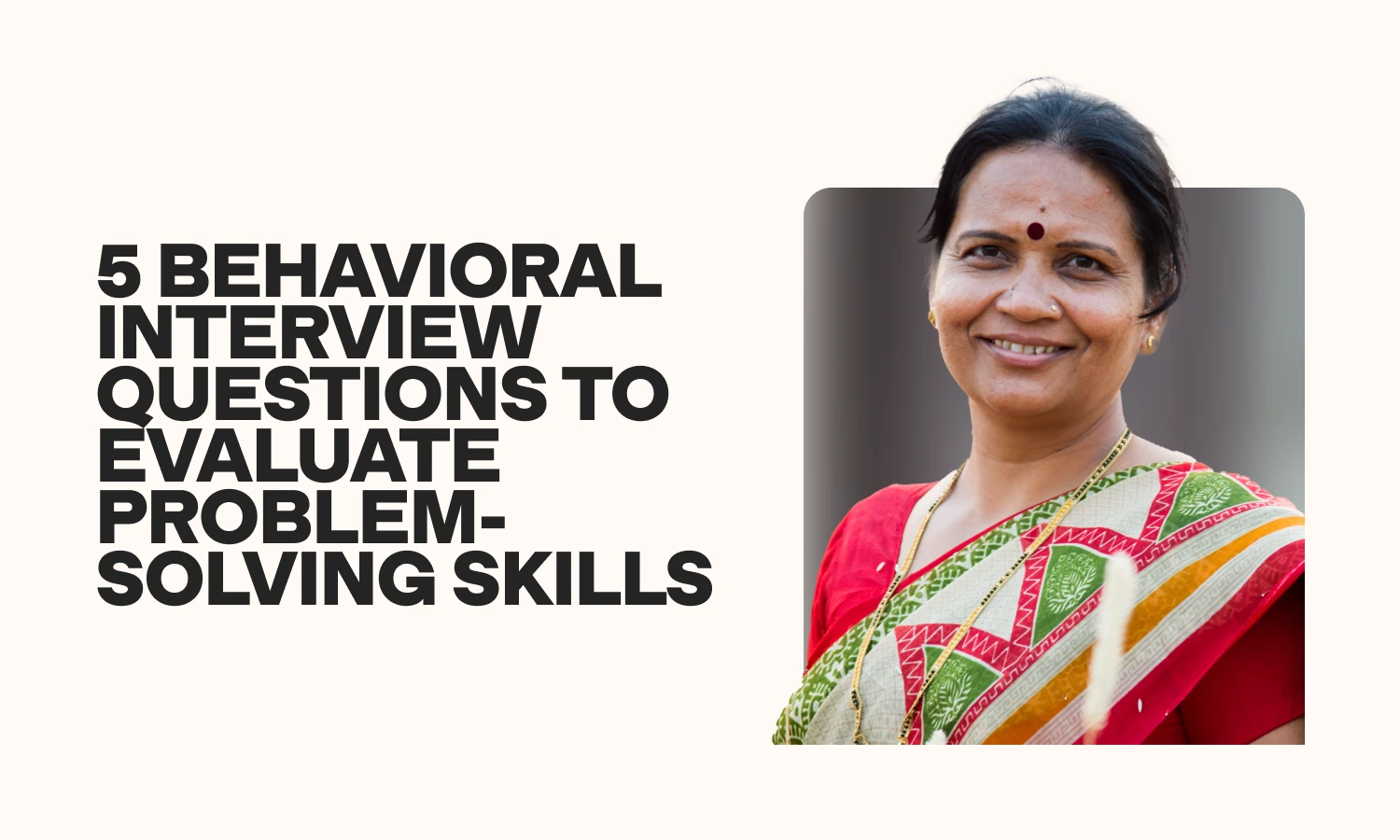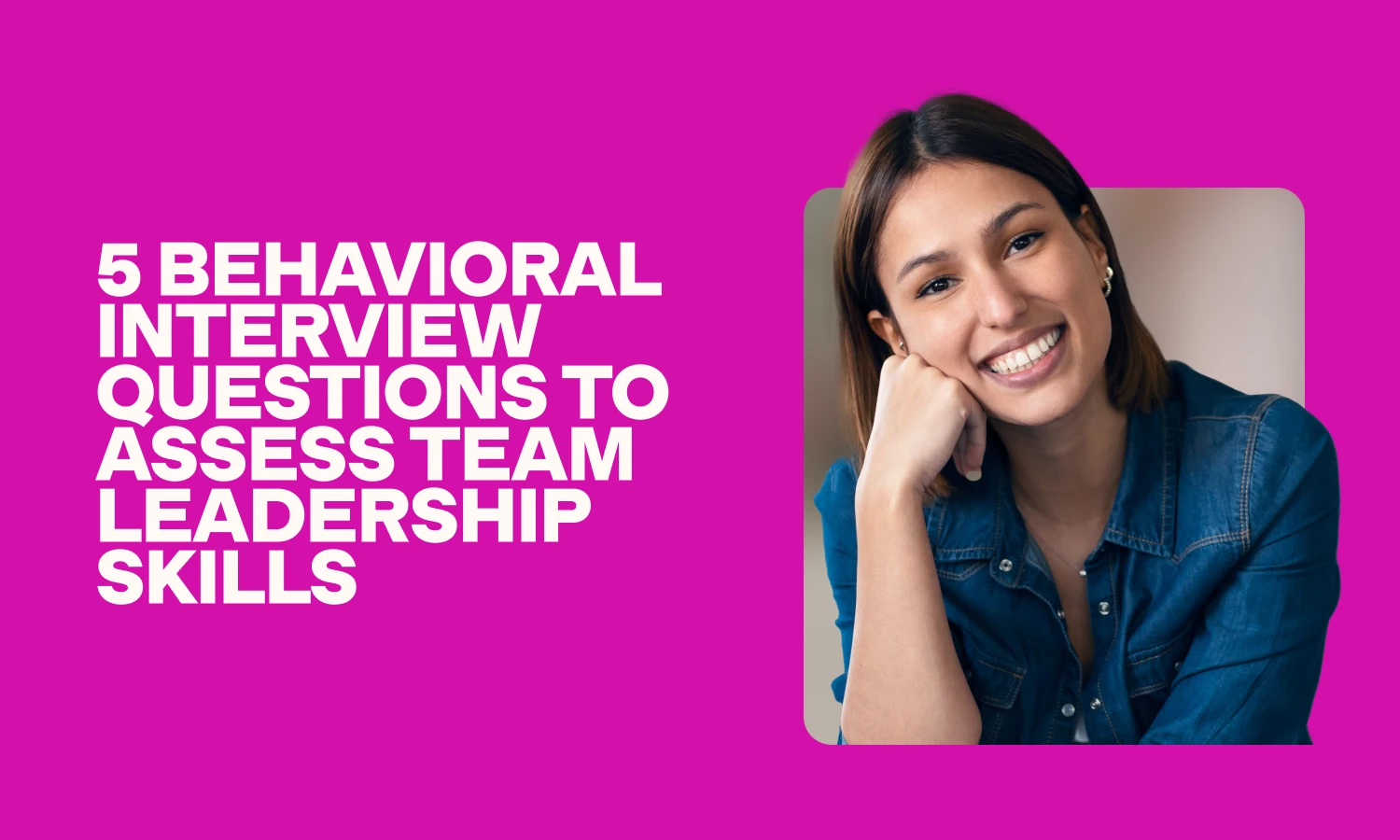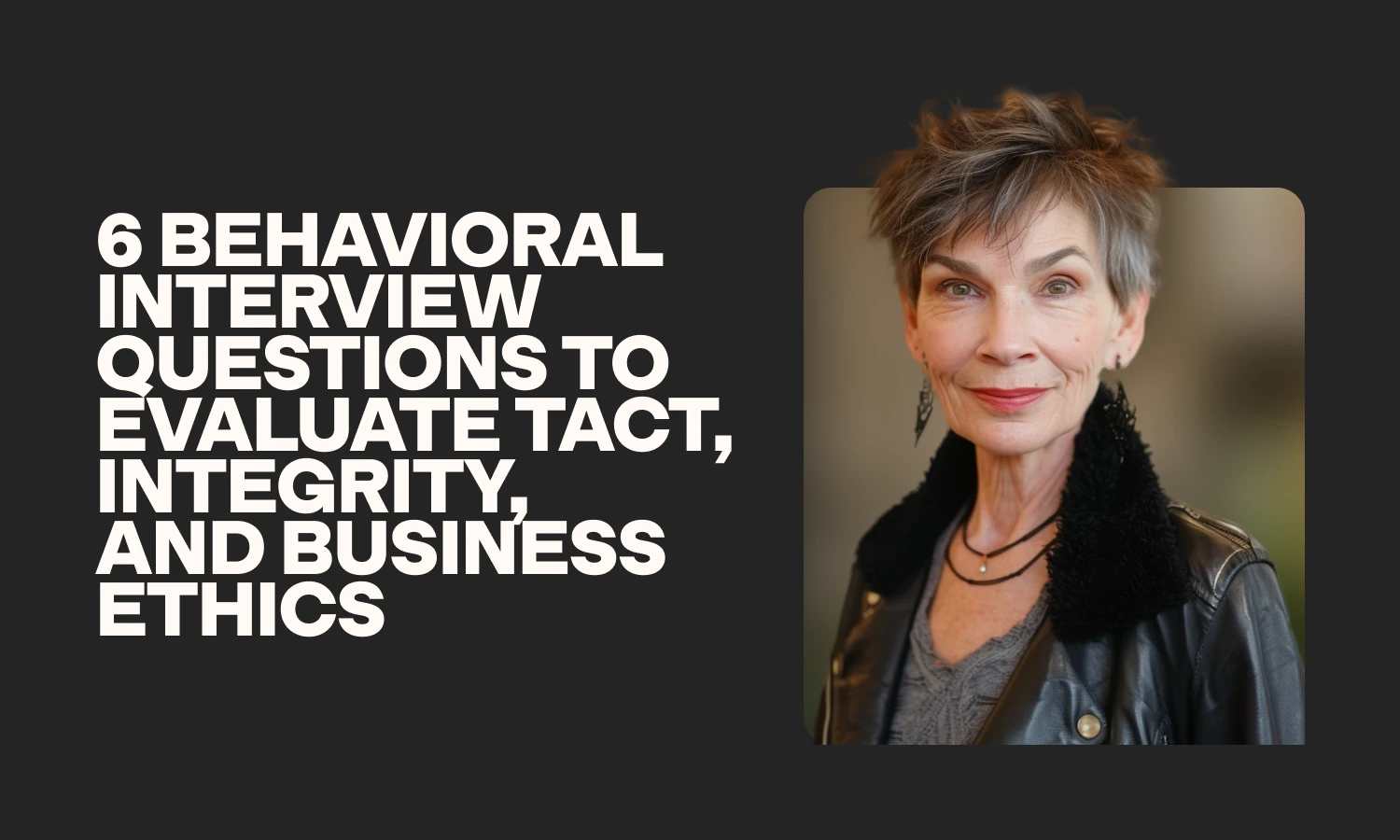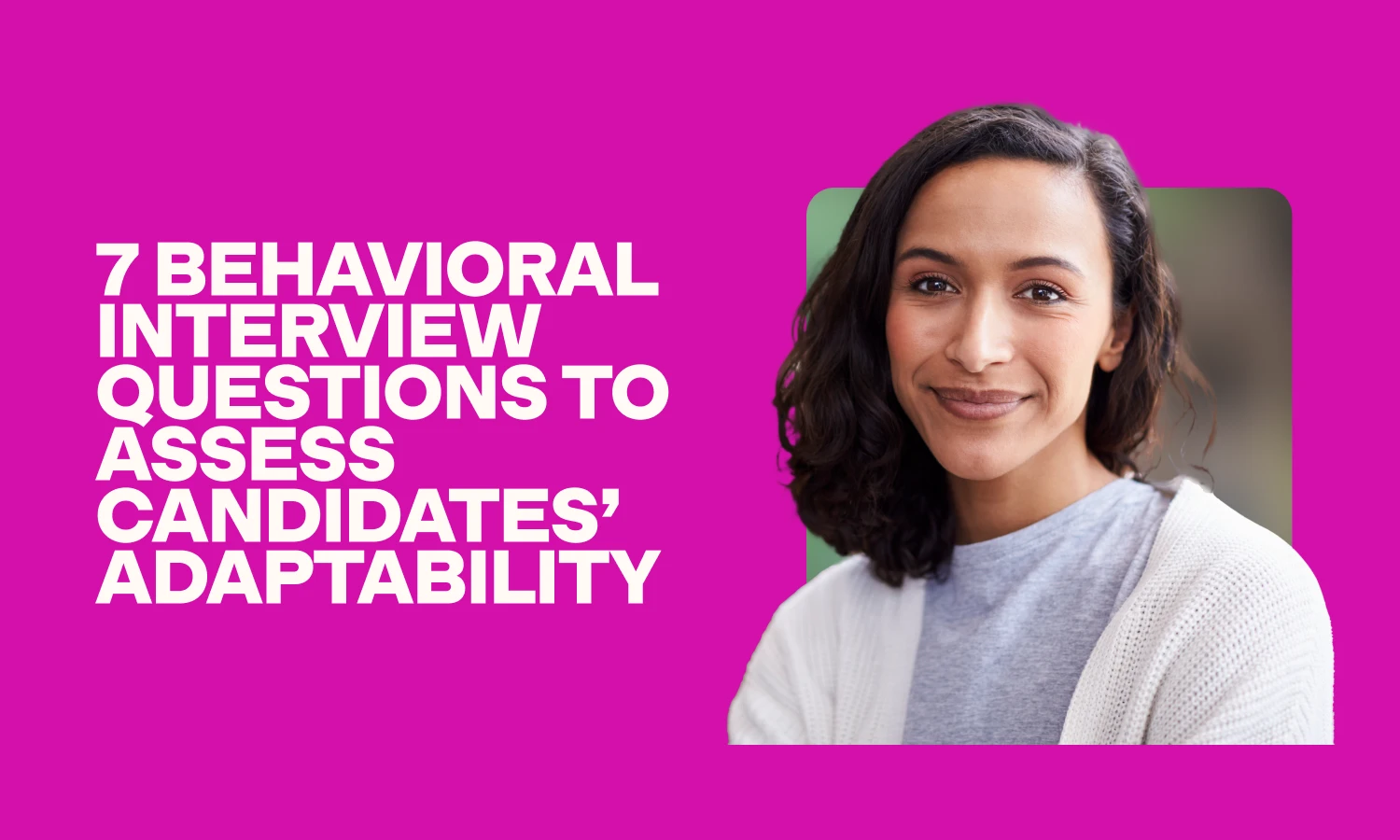50 behavioral interview questions to hire top candidates
Assess your candidates' personality with TestGorilla
Part of a good hiring process involves evaluating your candidates’ behavior: their personality traits, interpersonal skills, their actions, and the things that motivate them.
For this, you may use a behavioral or personality skills assessment, such as a DISC test or a Big 5 (OCEAN) test, which you can then complete with behavioral interview questions during the interview stage of the hiring process.
If you’re not sure which behavioral interview questions to ask, that’s what this article is for. Pick from the 50 behavioral interview questions listed below to get to know your candidates better.
Table of contents
- 6 frequently used behavioral interview questions
- 6 behavioral interview questions to assess communication skills
- 3 behavioral interview questions to evaluate team collaboration
- 4 behavioral interview questions to assess task management
- 5 behavioral interview questions to evaluate problem-solving skills
- 5 behavioral interview questions to assess team leadership skills
- 6 behavioral interview questions to evaluate tact, integrity, and business ethics
- 5 behavioral interview questions to assess candidate values and culture add potential
- 3 behavioral interview questions to assess conflict resolution skills
- 7 behavioral interview questions to assess candidates’ adaptability
- 3 ways to carry out a behavioral interview fairly and thoroughly
- Put together a comprehensive list of behavioral interview questions to hire top talent
6 frequently used behavioral interview questions
These six behavioral interview questions are ideal for assessing several skills, including task prioritization, behavioral skills, and how well candidates interact with clients.
1. Which skills would you say are critical for working with a team?
Sample answer:
For me, three critical skills when working with a team are time management, communication, and conflict resolution.
Time management skills and communication can affect the speed and quality of work completed by the team, which is why I highly value these skills in the workplace.
Conflict resolution is also essential—it’s a behavioral soft skill that can enhance team members’ ability to get along with others and therefore also affects productivity.
2. What is your task prioritization process?
Sample answer:
I tend to use a to-do list to break down each project into easier tasks, then order all tasks by priority, and work my way through the list by completing the most urgent or critical tasks first.
3. Has there ever been a time when you chose not to act in line with your organization’s policy?
Sample answer:
I always act in line with the company policy. There are always ways to assist clients, even if they’re unhappy with the company policy, by using the right behavioral soft skills.
I always use empathy when dealing with clients, particularly when they’re unhappy with a service. I then use critical thinking and problem-solving skills to offer them alternatives they’d be satisfied with.
4. What is your approach to handling project delays?
Sample answer:
To handle project delays, I hold frequent meetings until the project is completed and re-prioritize tasks as needed. If it becomes apparent that further delays might occur, I’d encourage communication, attempt to minimize delays by reassigning specific tasks, and ask for help from other teams or colleagues.
Find the right personality fit for your team
Discover how to use our range of personality tests with a free live demo
5. Can you give an example of how you’d appease a customer who’s disappointed with a service or product?
Sample answer::
In situations like these, I would empathize with the customer. I would then apologize for the error immediately and look for ways to improve their experience.
Throughout the interaction, I’d strive to build trust with the customer by assuming responsibility for the error and attempt to resolve the problem by getting in touch with other teams that could help me resolve the issue, for example, with our technical support assistance.
6. How do you make sure you’re constantly improving your skills?
Sample answer:
One of my goals is to learn about new technology. My approach involves studying and using self-learning behavioral approaches to keep up-to-date. I put my technological knowledge into practice by implementing new skills at work.
For example, I enhanced the UX of my organization’s website with the knowledge I had gained through a self-study course in the best practices of UX design.
6 behavioral interview questions to assess communication skills
The following six behavioral interview questions will help you assess your candidates’ communication skills and style, as well as their ability to interact with team members.
1. How would you describe your communication skills?
Sample answer:
I believe that listening is a critical part of communication and I’d say that I’m a discerning listener. I’d go as far as to say that listening should be a priority during communication. Once you have all the necessary information, you can then break it down into smaller parts to explain it to other team members.
2. How do you present critical new information to a group of colleagues?
Sample answer:
When conveying new information to colleagues, I present it to them clearly and concisely, but this doesn’t only involve speaking. One skill I developed in my previous job is to instantly notice when others don’t understand me. Also, I’m very patient when explaining new information, and explain it in a few different ways, if needed.
So, I read the room and invite questions whenever I notice my co-workers are not following.
3. How do you respond to negative feedback or bad reviews? What is your process?
Sample answer:
For me, empathy is an essential behavioral soft skill that can help when responding to negative feedback or reviews. I always express my sympathy when a service or product doesn’t meet a customer’s expectations, ask questions to clarify the reasons for this, and try to better understand their feedback and get to the core of the problem.
I’d then apologize for the inconvenience caused and then, if we’re using email or chat, attempt to move the conversation offline (i.e. meet the client in person or talk to them on the phone) and resolve the problem with the team’s support.
4. Has there been a time that you gave negative feedback to an employee?
Sample answer:
When giving negative feedback, I balance it with positive feedback, and I also use tact and respect.
For instance, once I noticed one of our copywriters did not fact-check a statistic they were quoting, but that the quality of the writing was good. I relayed both sides of my feedback to encourage them and point out ways that they could improve.
5. Have you ever had to persuade or encourage your co-workers to approach a task differently?
Sample answer:
On one occasion, I managed to convince my team members to deliver more engaging lessons for their students by incorporating games and songs in their sessions. I used motivational strategies, clear communication, and logical influencing tactics to suggest the change.
As a result, the students were more engaged and made faster progress in the next lessons, which helped the teachers’ team achieve their goals.
6. Which steps have you taken to enhance your communication skills?
Sample answer:
For me, presentations are an excellent opportunity to communicate a message to team members. I worked on my presentation and communication skills by practicing the right body language and how to use an engaging voice.
When I was asked to deliver a team training presentation, I received positive feedback from team members, who acquired new content marketing skills from the training.
3 behavioral interview questions to evaluate team collaboration
Use these three behavioral interview questions to evaluate how well your candidates can work with team members and assess their approach to completing tasks with others. For more questions, check out our article on the best collaboration interview questions.
1. How do you interact with co-workers who approach tasks differently?
Sample answer:
I think using discretion and building trust with co-workers is essential when collaborating with them. Even if they used different approaches, I’d try to recognize their working style and acknowledge the strengths of their approach. I’d communicate with them regularly and try to use the skills we have in common to approach the task.
2. Have you ever worked within a team and found that a co-worker was struggling with a task?
Sample answer:
On one occasion, my colleague was unsure how to handle behavioral issues in the classroom. My first approach was to recognize and acknowledge the challenges they were facing. I then helped them define a strategy and broke it down into smaller, achievable goals.
This included moving a student to another desk in the classroom, using time-out, and, as a last resort, communicating with parents to discuss their children’s behavior.
I then followed up with the co-worker to see if they needed any further support.
3. How do you motivate other team members?
Sample answer:
I use three fundamental approaches to motivate team members and help them achieve goals.
First, I clearly establish what the goal is and recognize the eventual difficulties in achieving it. Then, I advise on the goal and the specific approach that could be used. For example, if a co-worker needed to understand how to fix bugs in their code, I would advise them on the specific debugging tool to use in their case.
Finally, I would check with them frequently to see how they are progressing with the goal.
4 behavioral interview questions to assess task management
You can use the following five behavioral interview questions to help you assess your candidates’ time and task management skills and how they approach task delegation.
1. What approaches do you use to deliver quality work without succumbing to stress?
Sample answer:
My primary approach as a content writer when delivering quality work is to use a checklist and an outline for the final article.
For example, since there are so many different elements to focus on when writing an article, I work my way through the checklist methodically to ensure that all aspects are accounted for.
This way, I can break the article down into different sections and avoid moving unnecessarily between different elements. It’s a pressure-free way to write content.
2. What is your approach to providing accurate estimates for the time you need to complete a task?
Sample answer:
As a copywriter, I often time myself when writing copy for different clients. This way, I have a good idea of how long certain projects will take. However, if it’s a big project, I break it down into further smaller tasks, then estimate the time I need for each task.
For example, I split the project into subtasks, such as planning, writing, and editing, and provide estimates for each phase. Planning a blog post might take me 45 minutes, writing it might take three hours, and editing it could take an hour.
3. Which steps do you take to plan your tasks?
Sample answer:
As I’m always aiming to be meticulous and precise, I plan tasks thoroughly. A part of my approach to planning involves looking at the bigger picture and the end goal, dividing the project into several sections, and setting deadlines to achieve each goal.
4. You receive unclear instructions for a task. What steps do you take to handle it?
Sample answer:
Before I proceed with a task, I always make sure I understand the instructions and do the necessary research to figure out what I need to do to complete it.
If I still don’t understand everything, I approach the team lead or project manager and ask questions to clarify the requirements. I always ask what the result should be and, if unclear, ask for an example.
5 behavioral interview questions to evaluate problem-solving skills
Use these five interview questions to find out whether your candidates know how to deal with complex challenges and find the right solutions.
1. Can you describe a situation where you made an error at work? What steps did you take to correct it?
Sample answer:
On one occasion, I booked an appointment for a patient on the wrong date, but I didn’t realize my error until the end of the day. When I checked the appointment slot they had requested, it was no longer available. I decided to act immediately to correct the error and contact the patient, which also meant staying at work a bit longer.
I called the patient, explained the error, and offered him another slot on the same day they had requested after checking with the head of the practice.
2. How do you encourage others to solve problems using unpopular solutions?
Sample answer:
If I’m certain my solution is the right one, I present my idea to the team, describe its merits, and discuss it with others, despite the fact that it’s unpopular. I use facts and statistics to show the potential benefits and convince others to adopt my approach.
At the same time, I welcome suggestions on how to enhance the solution and encourage team members to ask questions and give their opinions.
3. Have you ever failed to accomplish a task?
Sample answer:
In my previous software engineering role, I was unable to fix a bug in my code. As a result, I was not on time for the release, so I was unable to meet the deadline. I have since learned several bug-fixing techniques to improve my efficiency and output. Additionally, I always aim to develop knowledge of areas in which I’m not as confident.
4. Have you ever implemented an innovative or unique solution to solve a complex problem?
Sample answer:
A complex problem that my HR department encountered was the lengthy hiring process. We needed to reduce the time to hire substantially, as we were losing our top candidates to competitors who were faster to make an offer.
I decided to research a few alternative hiring approaches, one of which was inbound recruitment. As a team, we evaluated the pros and cons and decided to implement this strategy. It involved additional research that crossed over into marketing, but in the end, it was worth it.
Our talent pool was larger, and we began to make new hires in two weeks, instead of the usual three to four.
5. Can you give an example of how you had to readdress a complicated problem after receiving important new information about it?
Sample answer:
I learned that one of my students had dyslexia in my previous teacher role, which meant they struggled with reading and writing. I changed the way I delivered my lessons by implementing other techniques, including visualization during reading. I also encouraged them to read passages out loud.
After that, they felt more comfortable and were able to complete the book report with which they initially struggled.
5 behavioral interview questions to assess team leadership skills
Use these five questions to assess candidates’ preparedness for leadership roles and their ability to delegate tasks, handle feedback, and mentor employees.
1. How do you handle negative feedback from an employee?
Sample answer:
I use three methods when handling negative feedback from employees. First, I use active listening to learn what the feedback is. Then, I ask clarifying questions to make sure I fully understand the issue. Finally, I implement a plan to take action.
Since feedback is valuable and can help enhance the performance of both individual team members and the team as a whole, I take it very seriously and always listen to what my employees have to say.
2. Have you ever had to change tactics when delegating tasks?
Sample answer:
On one occasion, I quickly noticed that one of my copywriters was struggling to complete a task. I asked a senior copywriter on the team to assist them. I chose a writer who was knowledgeable on the subject matter required for the copy, and the project got completed quickly and efficiently.
3. Which skills do you believe are essential for leadership?
Sample answer:
I think soft skills are critical for leadership positions. Empathy and understanding non-verbal cues are key to assisting a team. I also challenge myself to be a good role model and use active listening during team collaboration.
For instance, during discussions about problems we’re facing, I set an example and encourage others to listen to other team members.
4. Have you ever mentored or supported an employee? What was your approach?
Sample answer:
In a previous role, I assisted and mentored an employee as part of their onboarding. My approach was to encourage them to ask questions to help them settle into the role. I used active listening and empathy to learn which aspects of the job were the most challenging for them.
For instance, they were unsure how to use the different communication tools we had, so I explained how to use them and in which instances to use direct and group messages.
5. What is your approach to task delegation?
Sample answer:
For me, task delegation is about playing to team strengths. When one of the teachers on the team was unwell, I had to choose a substitute to stand in. I chose a teacher who had experience teaching children of a similar age group and the lesson went well.
Since the original teacher was away for the whole week, I explained each lesson to the substitute, who was able to understand the plan’s content and deliver it effectively.
6 behavioral interview questions to evaluate tact, integrity, and business ethics
These six interview questions are ideal for evaluating your candidates’ ability to handle sensitive situations in the workplace. You can use them in your interview process for roles where business ethics and compliance are key.
1. How do you understand ethical behavior in a business context?
Sample answer:
I think ethical behavior entails carrying out the responsibilities and duties of the business while aligning such actions with moral principles, such as transparency, honesty, integrity, respect, inclusiveness, and equality.
2. Describe a situation where you noticed that a team member’s behavior was affecting team cohesion. How did you react?
Sample answer:
On one occasion, I noticed that one of my team members simply dismissed another co-worker’s opinion on improving a cloud license service, without being tactful and considerate. I stepped in as a manager to say that the employee should focus on making progress on the project and encourage others to contribute ideas.
3. Can you give me an example of a time when you had to use discretion and diplomacy when speaking with a client (or a candidate)?
Sample answer:
In my previous role, I had to tactfully share the news that a candidate wasn’t selected for a position they applied for. I began by expressing my appreciation for their application and used empathy when acknowledging that they were unsuccessful.
Since the candidate experience is crucial, and the candidate was our second best applicant for this role, I then mentioned that we would welcome a future application from them.
4. How have business ethics proven to be essential in your previous roles?
Sample answer:
Business ethics were crucial in my previous role as a marketing assistant at a retail company, and I relied heavily on certain principles, such as inclusiveness, product alignment, and transparency, in our marketing messages. This improved the customer experience.
5. Have you ever had to challenge an unethical business practice?
Sample answer:
On one occasion, I encountered an ethical dilemma related to the coffee we sold and served in our coffee shop, which was supposed to be ethically sourced from small-scale coffee farms. I had, however, doubts about it.
I insisted that we look into the remuneration of farmers and their working conditions. We looked at the different types of coffee beans and the remuneration of farmers for each type, in order to make sure farmers were paid an adequate wage, as per the certification’s standards.
6. Describe a situation where your colleagues broke the rules or policies of your organization.
In a previous role, I noticed that one colleague was stealing from the store. I reported the situation to maintain the business’ ethical code. I was in an ethical dilemma as I knew they would be dismissed, but the company would suffer financially if I failed to report them.
5 behavioral interview questions to assess candidate values and culture add potential
Find out whether your candidates’ values align with your organization’s culture by asking the following five behavioral interview questions.
1. What is your approach to setting targets for yourself?
Sample answer:
I always break down tasks into achievable goals when setting targets for myself.
In a previous teacher role, I had to write 100 reports for different classes. To set targets, I timed how long one report took. I then calculated how many I could achieve in one day. Finally, I extrapolated how long it would take to finish them all based on my calculations.
2. Is meeting deadlines or producing quality work more important to you?
Sample answer:
As a software engineer, I know that quality is essential. Though I always try to meet deadlines, rigorous testing is critical and I consider this the priority. I knew the deadline was approaching in a previous project, but testing had revealed a few errors. I prioritized fixing the errors because quality was more important for the team.
3. How do you approach repetitive tasks?
Sample answer:
I have a few motivational strategies that I use to tackle repetitive tasks. I set myself achievable goals to ensure that I complete a certain amount each day and challenge myself to complete as much as possible.
I also sometimes use creative approaches to make the task more interesting. For example, I give myself a time limit to make the task seem like a competition. This helped with my previous role, in which I had to fix broken hyperlinks.
4. Which is your best achievement in your career?
Sample answer:
My biggest achievement was hiring three software developers for my team within a month.
It required creativity and combined inbound, employee referral, and internal recruitment methods. As part of the recruitment strategy, I created and implemented an employee referral program and incentivized the team by offering bonuses, which worked well.
5. If we don’t select you for this role, what are your professional plans?
Sample answer:
Since I always want to improve, I would aim to take the feedback provided from the interview and use it to enhance my copywriting skills. I would practice as much as possible and perhaps start blogging more often to hone my skills and then continue pursuing my goal, to become a junior (and eventually senior) copywriter, by applying for different roles.
3 behavioral interview questions to assess conflict resolution skills
Learn how well your candidates resolve conflicts in the workplace with the four behavioral interview questions below.
1. Can you describe a time when you didn’t agree with a co-worker’s methods to complete a project?
Sample answer:
In my previous role, one of my co-workers suggested we use an outbound marketing strategy, whereas I wanted to use an inbound marketing approach.
I used active listening skills to understand my co-worker’s perspective and then presented the benefits of inbound sales strategies in the context of our organization with statistics to back it up.
2. Describe a time where you disagreed with your manager and had to express your position.
Sample answer:
On one occasion, my manager proposed we alter the sales pitch for presenting our MVP. I thought it was effective but then noticed that it could be improved. We worked together alongside the other sales reps to enhance the sales pitch, which was a huge success.
3. Describe an occasion where you received conflicting advice from two members of your team.
Sample answer:
In my previous role, a dental nurse mentioned that I shouldn’t use the emergency appointment slots too often. My other colleague suggested I do the opposite and book a patient’s appointment for midday on the same day.
In this situation, I made communication the priority. I asked for clarification from the head dentist. I also asked what the protocol should be for future appointments.
7 behavioral interview questions to assess candidates’ adaptability
Use the following seven behavioral interview questions to determine whether your candidates can adapt to new tasks or teams.
1. Tell me about a time you had to acquire new skills within a short period. How did you achieve this?
Sample answer:
When I was about to begin a new role as a senior software engineer, I had to refresh my knowledge of a programming language that I hadn’t used in a while.
I quickly took a look at a few open-source projects I had produced. I refreshed my memory and played around with the code and practiced my C++ skills . When I began the role, I felt more confident.
2. Have you ever had to adapt to new processes?
Sample answer:
In a previous role, our team made significant changes to the lesson plans we needed to use. I had to get accustomed to the change, so I asked questions to clarify the structure of the lesson plan and get familiar with the new approaches we would use to engage the students before the start of the term.
3. Have you ever had to adapt to new communication tools?
Sample answer:
Although I had never used Slack before, I did a little digging and researched its primary functions. I also tested it independently to put into practice what I learned. Thanks to this, I was able to understand how to use it and encountered no difficulties.
Try our personality tests for free
Our free plan enables you to use all ten of our personality tests. Today. Completely free.
4. What is your biggest challenge when starting a new role?
Sample answer:
For me, adapting to the company culture is the biggest challenge. But I’m open-minded, I embrace change, and I’m adaptable. I always learn as much as possible about the company before starting and try to embrace the core values and principles of the business.
5. How do you handle tasks when the requirements change?
Sample answer:
I first use communication and active listening skills to determine the new requirements and make sure I understand them. After that, I make a plan to incorporate those requirements. I try to remain in contact with the project manager while I implement the requirements and then ask for feedback and advice if I encounter any problems.
6. Have you ever had to work in a different department or environment?
Sample answer:
On one occasion, I was transferred to teach in a state school as opposed to the academy where I usually taught. This required me to be flexible, open-minded, and open to change. I adapted my approach to the lesson by adjusting my lesson plan. Being prepared helps!
I also revised the behavioral management policies of the school, which made a difference in the delivery of the lessons. In the end, the lessons were successful, and the students were happy.
7. What is your approach when starting a new task?
Sample answer:
When starting to work on a new task, I like to be prepared.
I use verbal communication and active listening skills to clarify what needs to be done. I then use problem-solving skills to divide the task into easier sub-tasks. And finally, I make a plan to tackle each sub-task methodically. I welcome feedback to improve and implement any changes that are needed.
3 ways to carry out a behavioral interview fairly and thoroughly
To avoid bias and learn as much as possible about your candidates, use the following strategies:
Use the same behavioral interview questions to evaluate all candidates. A standardized interview will help you ensure that the hiring process is fair and transparent and will also enhance the candidate experience.
Avoid closed questions. The answers to closed questions don’t give enough context or information. Ensure that you ask open-ended behavioral questions or start with a closed question and then immediately follow up with an open question.
Use interview scorecards to record answers. Scorecards can enhance objectivity when evaluating your candidates, so it’s a good idea to make them a part of your interview process.
Put together a comprehensive list of behavioral interview questions to hire top talent
Asking behavioral and performance-based interview questions is essential, but don’t panic if you’re struggling to create a comprehensive list—use the interview questions above to get inspired.
One final tip will help enhance your interview process: use a reliable skills testing platform to test your candidates’ behavioral and role-specific skills before you interview them. This way, you’ll be able to filter out unsuitable candidates quickly, and concentrate only on your best applicants.
Skills testing will also make a big difference to training and help you plan your future employees’ training sessions and onboarding.
With the right selection process and behavioral interview questions, you’ll be sure to hire top talent for your organization. Try TestGorilla for free today.
Related posts
Hire the best candidates with TestGorilla
Create pre-employment assessments in minutes to screen candidates, save time, and hire the best talent.
Latest posts
The best advice in pre-employment testing, in your inbox.
No spam. Unsubscribe at any time.

Hire the best. No bias. No stress.
Our screening tests identify the best candidates and make your hiring decisions faster, easier, and bias-free.
Free resources
This checklist covers key features you should look for when choosing a skills testing platform
This resource will help you develop an onboarding checklist for new hires.
How to assess your candidates' attention to detail.
Learn how to get human resources certified through HRCI or SHRM.
Learn how you can improve the level of talent at your company.
Learn how CapitalT reduced hiring bias with online skills assessments.
Learn how to make the resume process more efficient and more effective.
Improve your hiring strategy with these 7 critical recruitment metrics.
Learn how Sukhi decreased time spent reviewing resumes by 83%!
Hire more efficiently with these hacks that 99% of recruiters aren't using.
Make a business case for diversity and inclusion initiatives with this data.

